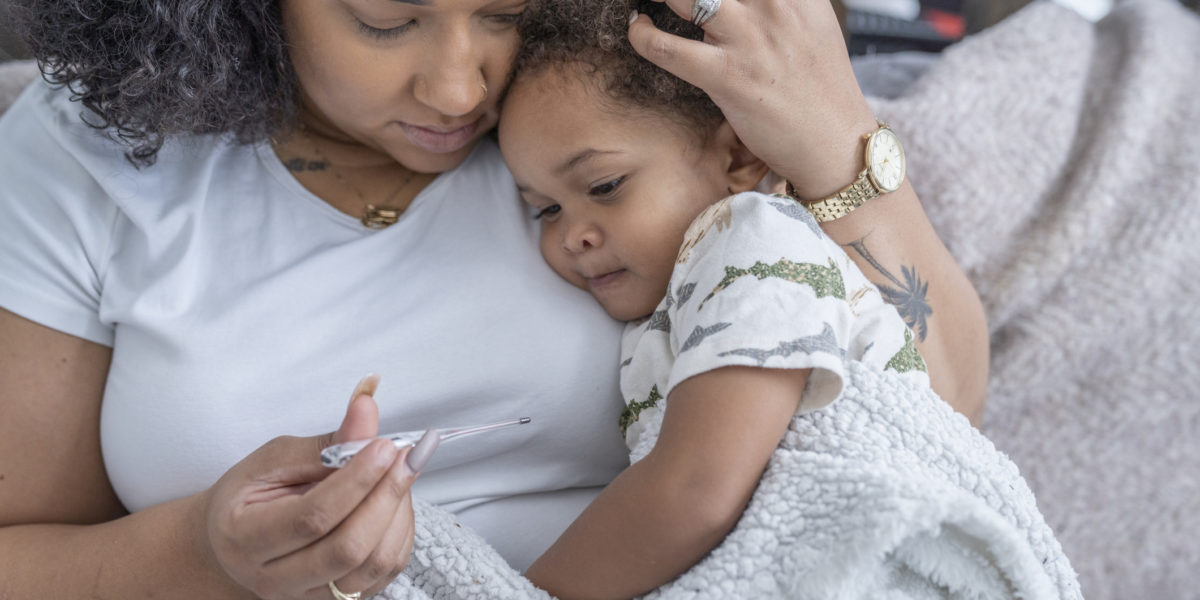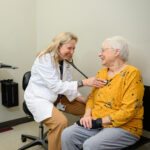5 Things to Know About RSV in Children
This respiratory virus spreads quickly. Here's what to do.

1. What is RSV?
RSV is short for respiratory syncytial virus infection. It causes the same symptoms as a bad cold. And like a cold, it is very common and spreads easily. Most children have had it at least once by age 2.
There are many kinds of RSV, so your child’s body never becomes immune to it. Your child can get it again and again, sometimes during the same season.
RSV affects your child’s nose, eyes, throat and lungs. It spreads when your child coughs, sneezes or shares food or drinks. RSV can make it hard for a child to breathe. It is important to watch the symptoms, especially in babies.
When a child with RSV is otherwise healthy, symptoms usually get better in a week or two.
2. What are the symptoms of RSV?
Symptoms of RSV include:
- A cough.
- A stuffy or runny nose.
- A mild sore throat.
- An earache.
- A fever.
Babies with RSV may also have no energy, act fussy or cranky and be less hungry than usual. Some children have more serious symptoms, like wheezing or trouble breathing. Call your doctor if your child is wheezing or having trouble breathing.
3. How can you prevent RSV infection?
It is very hard to keep from catching RSV, just like it is hard to keep from catching a cold. But you can lower the chances by practicing good health habits. Wash your hands often, and teach your child to do the same. See that your child gets all the vaccines your doctor recommends.
4. How is RSV treated?
Home treatment is usually all that is needed.
Fluids
-
Give your child lots of fluids. Offer your baby breastfeeding or bottle-feeding more often. Do not give your baby sports drinks, soft drinks or undiluted fruit juice, because these may have too much sugar, too few calories or not enough minerals.
-
Give your child sips of water or drinks such as Pedialyte or Infalyte. These drinks contain the right mix of salt, sugar and minerals. Do not use them as the only source of liquids or food for more than 12 to 24 hours.
- Let your child rest. Unless you see signs of dehydration, don’t wake up your child during naps or at night to take fluids.
Medications
-
Give acetaminophen (Tylenol) or ibuprofen (Advil, Motrin) for fever if your child’s doctor says it is okay. Read and follow all instructions on the label. Do not give aspirin to anyone younger than age 20. It has been linked to Reye syndrome, a serious illness.
-
Be careful when giving your child over-the-counter cold or flu medicines and Tylenol at the same time. Many of these medicines have acetaminophen, which is Tylenol. Read the labels to make sure that you are not giving your child more than the recommended dose.
-
Be careful with cough and cold medicines. Don’t give them to children younger than age 6, because they don’t work for children that young and can even be harmful. For children ages 6 and older, always follow all the instructions carefully. Make sure you know how much medicine to give and how long to use it. Use the dosing device if one is included.
Soothing a stuffy nose
- If your child has problems breathing because of a stuffy nose, squirt a few saline (saltwater) nasal drops in one nostril. Have older children blow their nose. Repeat for the other nostril. You can also place extra pillows under the upper half of an older child’s body.
- For babies, put a drop or two of saline in one nostril. Using a soft rubber suction bulb, squeeze air out of the bulb, and gently place the tip of the bulb inside the baby’s nose. Relax your hand to suck the mucus from the nose. Repeat in the other nostril.
- Keep your child away from smoke. Smoke irritates the breathing tubes and slows healing.
5. When should you call your doctor?
Call 911 anytime you think your child may need emergency care. For example, call if:
-
Your child has severe trouble breathing. Signs may include the chest sinking in, using belly muscles to breathe or nostrils flaring while your child is struggling to breathe.
-
Your child is groggy, confused or much more sleepy than usual.
Call your doctor now or seek immediate medical care if:
-
Your child’s fever gets worse.
-
Your baby is younger than 3 months old and has a fever.
-
Your child gets tired during feeding because of trying to breathe. The child either stops eating or sucks in air to catch a breath. The child loses interest in eating because of the effort it takes.
-
Your child has signs of needing more fluids. These signs include sunken eyes with few tears, dry mouth with little or no spit and little or no urine for six hours.
-
Your child starts breathing faster than usual.
-
Your child uses the muscles in the neck, chest and stomach when taking in air.
Watch closely for changes in your child’s health, and contact your doctor if:
-
Your child’s symptoms get worse, or your child has any new symptoms.
-
Your child does not get better as expected.


